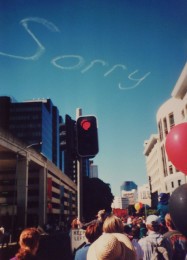Overapologizing in The Modern Age

Saying ‘I’m sorry’ too much, especially at work, gets a bad rap. It’s meek; it’s feminine, overly accommodating, self-deprecating; it’s fake. As a chronic over-apologizer in social interactions, if not in the big ways when it matters (for better or worse!), I really loved Clay Risen’s essay about empathy and the different kinds of sorry:
I’m not actually sorry for being five minutes late to a meeting, or brushing against someone’s shoe. Rather, I’m showing empathy — but not too much, because everyone involved knows these are pretty low-level incidents. I understand that contact with my shoe might have disturbed you — but I also figure that you probably didn’t even notice, on a crowded train. I’m sorry I’m late to the meeting, even though I know you started without me, and that I could have just played hooky and no one would have cared.
It’s what a psychologist would call a “low-cost interpersonal strategy” — on the off chance that you might have been offended by something I did, I’ll defuse it with a two-syllable word, and show that I’m attuned to your troubles, however minor. It’s a social lubricant, a little bit of which helps reduce the need for major repairs later on.
YES. Is it cheating to say sorry when you aren’t sorry? Or are you just attuned to the possibility that you have inconvenienced people?
Sometimes I wonder if apologizing all the time is actually selfish — I’ve potentially bothered you, so now not only did I inconvenience you, but you have to listen to my apology and do the emotional work to assure me that it’s fine. You do even more work, and I get away with a clear conscience.
This is fascinating, though:
And for all the column inches spent denouncing casual sorrys, this sort of new twist on the old apology is widely used and, I would argue, well understood, part of a general turn toward a more empathetic everyday English. The linguist John McWhorter argues that, far from degrading the language, many of the interjections that have crept into everyday speech in recent decades — “like,” “totally,” “LOL” — are signs that we’re becoming more sensitive, as a society, to others.
I want to believe we live in a world that is getting more empathetic every day. And I want to live in a world that lets me use the couched language that is supposedly feminine, weak, etc. I love my “kind ofs” and my “likes” and my “I feels.” Who is truly sure of anything?
Photo via flickr
Support The Billfold
The Billfold continues to exist thanks to support from our readers. Help us continue to do our work by making a monthly pledge on Patreon or a one-time-only contribution through PayPal.
Comments